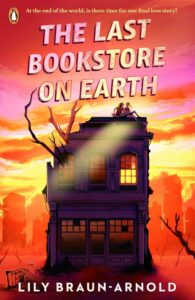This post was written by Lily Braun-Arnold, author of The Last Bookstore on Earth.
I wrote my debut novel, The Last Bookstore on Earth, three times.
Okay, that’s not entirely true. In June 2020, I was obsessed with the apocalypse. It was the only type of media I consumed and thus the only thing I wanted to write about. And sure, I was 15 and had absolutely no idea how to write a coherent narrative, but that didn’t stop me. A month later, I had a finished manuscript in my hands. And it was horrible.
The next summer, I tried the same thing all over again. I still needed to write something about the apocalypse—something about the desolation it provided drew me in, even a year later. I told myself that I’d learned my lesson from the year before and that this was going to be my magnum opus. Something would shift and the apocalyptic story I had in my head would suddenly translate to the page. I know there’s some famous quote about how doing the same thing again and expecting a different result is madness, but I was certain that I was the exception to the rule. A month later, I had a manuscript in my hands, and while it was slightly better, it still wasn’t working.
During my senior year of high school, sandwiched between summer 2021 and 2022, I began working at my local independent bookstore, Watchung Booksellers. It was a dream job, one that I’d had my sights set on since I’d moved to New Jersey in elementary school and first gone to the bookstore. As a bookworm, I knew it would be nice to be surrounded by books all day, but I didn’t fully understand how much the bookstore would mean to me.
During senior year, the bookstore was a much needed constant in my life. No matter what was going on, whether it be math finals or college decisions, I could always count on the bookstore and the people in it to cheer me up or calm me down. By the time I was leaving to go to college, I couldn’t really imagine a world without it.
View this post on Instagram
So, that summer, in the months before I left for school, I tried again. Every day I’d sit out on my porch, drink a Coke slushie, and listen to Alanis Morisette as I tried to bang out as many words as possible. In many ways, it was still the same story I’d written before, just with different characters and a different premise. It was still centered around themes of grief and guilt and desolation and loneliness. But this time, there was a bookstore.
The bookstore was the missing piece of the equation. It’s a place that’s imbued with community, something that an apocalyptic setting often lacks. My local bookstore was always hosting events, author readings, and story times. As a bookseller, I was giving recommendations for books to give at baby showers, or 9th birthday parties, or graduations. The constant connections being made within the bookstore was something that provided me comfort, and something that one of my characters, Maeve, comments on in the book. She remarks that “it must be nice to always have people”, something that Liz, the novel’s main character, takes for granted. Even in the absolute desolation of the end of the world, community can still be found at the last bookstore on Earth.
Of course, bookstores wouldn’t exist without the stories that they contain. Books offer escapism and familiarity, two things that are vital during dark times. Even in the worst of all possible situations, customers still return to Liz’s bookstore because there’s something about literature that is still necessary. So necessary that they’re willing to trade much needed supplies for it.
For Liz, the apocalypse has destroyed everything that she once loved. Her family is gone, her future is gone, all she has is the bookstore and the books within it. Liz spends a lot of the novel reading, often putting a well worn copy of something interesting down to rejoin the action. For her, it’s self preservation. In order to continue her pursuit of survival, she must press pause every once in a while. While I haven’t experienced the end of the world myself, I have returned to my favorite books when I’ve needed a boost. Something about returning to familiar characters and settings is incredibly soothing, as is following a plot when you know that everything will turn out alright in the end.
The bookstore was the critical part that made my apocalyptic dreams a reality, but bookstores remain important, apocalypse or no apocalypse. They’ve always provided me with a sense of warmth and community, even as I’ve moved away from home and gone off to college. I hope you, too, can find a bit of comfort—no matter how armageddon tinted—in The Last Bookstore on Earth.
 Get your copy of The Last Bookstore on Earth by Lily Braun-Arnold here.
Get your copy of The Last Bookstore on Earth by Lily Braun-Arnold here.


